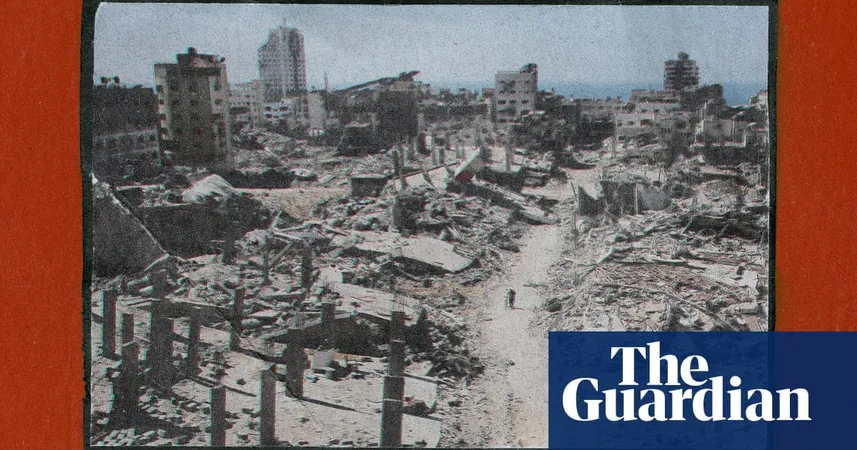
Scholars Divided: The Genocide Debate Ignited by Gaza Conflict
2024-12-20
Author: Chun
Introduction
This month, the release of two impactful reports by Amnesty International and Human Rights Watch has stoked an intense debate regarding the characterization of the ongoing war in Gaza, where over 45,000 Palestinians have lost their lives and vast areas have been devastated. With one report affirming that Israel is committing genocide and the other claiming it is perpetrating acts of genocide, the academic community remains deeply split, reflecting long-standing divisions within the field of Holocaust and genocide studies.
Philosophical Divide
This scholarly rift highlights a significant philosophical divide: some scholars argue the Holocaust stands alone as a unique historical event, while others advocate for a comparative approach that examines different instances of mass violence. Such debates around the purpose of genocide studies have resurfaced as academics grapple with the implications of recent violence.
Tensions at Holocaust Conference
Tensions flared last year at a Holocaust conference in Prague, occurring just after the Hamas attacks on October 7 and amid extensive Israeli military responses that had already claimed thousands of lives. Disagreements erupted during discussions when pro-Israel scholars reacted defensively to critiques of Israel's military actions, asserting that terrorism justified the response. In stark contrast, some academics passionately argued that 'genocide is worse than terrorism.' The atmosphere became so strained that pairs of scholars with opposing views chose to sit at opposite ends of the dining table.
Recent Developments
In the wake of the conflict, the sentiment condemning Israel's actions as 'genocide' has gained traction, particularly following a ruling from the International Court of Justice, which indicated a 'credible risk' of genocide in Gaza. While some voices have advocated for immediate intervention, the International Criminal Court has so far refrained from leveling genocide charges against Israeli officials, focusing instead on war crimes and crimes against humanity.
Crisis in Genocide Studies
Despite the escalating narrative surrounding potential genocide, many scholars remain reticent. Raz Segal, a historian who has been vocal in labeling Israel's actions as genocide, asserts that this situation has escalated a 'massive crisis in the field.' He points out how the contention over Israel's actions only deepens the fractures that have historically troubled genocide studies.
Historical Context
Historically, the field of genocide studies emerged from the Holocaust and evolved during the 1990s amid global events like the Rwandan and Bosnian genocides. This expansion sparked disagreements over whether such instances could be measured and compared, shaking the foundational belief in the uniqueness of the Holocaust. Segal dangerously faced pushback for his position, leading to the University of Minnesota rescinding an offer for him to lead their Center for Holocaust and Genocide Studies.
Semantic Battles
Norman Goda, a fellow Holocaust studies professor, maintains that the latest crisis has amplified pre-existing semantic battles around antisemitism, terrorism, and colonialism. He perceives the allegations of genocide as a mask for an underlying agenda that calls into question Israel's legitimacy as a state, thus diluting the true weight of the term 'genocide.'
Opposing Views
Conversely, many scholars advocating for the characterization of genocide argue for the application of established frameworks for understanding mass violence to the current context in Gaza. Üngör notes the cognitive dissonance present among scholars who struggle to accept that a nation historically victimized could commit acts of genocide.
Divided Opinions
Amidst these academic tensions, early op-eds and open letters have surfaced with sharply divided viewpoints. While over 150 academics framed the Hamas attacks as reminiscent of historical pogroms, a smaller faction of over 55 scholars warned of the impending 'danger of genocide' by Israeli forces, calling for a duty to intervene.
Journal of Genocide Research
The Journal of Genocide Research has published explorations into Israel’s actions alongside a debate regarding the end of 'Israel exceptionalism' and questioning the relevance of genocide studies in light of Gaza’s destruction.
Wider Implications
The wider implications of the Gaza conflict have alarmed many in academia as overt disagreements threaten to fracture long-standing professional relationships and impede meaningful discourse on genocide. Marianne Hirsch, a retired professor with a focus on trauma, likened the situation to an intellectual break that may never heal.
Academic Freedom Concerns
In addition to this academic fallout, a worrying trend has emerged across various universities, particularly in the U.S., where perceived threats to academic freedom have made scholars cautious in expressing their views. Omer Bartov, a professor at Brown University, highlighted the escalating climate of fear, illustrating how sensitive the discourse has become, where even nuanced critiques invite personal backlash.
Legal Interpretations of Genocide
The nuances of this debate also hinge on legal interpretations of genocide, specifically concerning the established requirement of demonstrating 'genocidal intent.' The varying definitions and contexts have led to contentious discussions among legal experts and scholars alike.
Conclusion
William Schabas, an international law professor, acknowledged that the complexities concerning genocide discourse do not diminish the urgency of addressing atrocities, regardless of their classification. This unresolved tension reflects a broader moral responsibility scholars feel to prevent genocide, as articulated by Hirsch, who urged that 'genocide prevention is a responsibility.' As global awareness rises, the question looms: will scholars take an active role in preventing future genocides or remain trapped in academic disputes? As the war in Gaza continues and the death toll mounts, the urgency for clarity and actionable responses only intensifies, prompting scholars to evaluate their stances and the implications of their work in an ever-volatile world stage.



 Brasil (PT)
Brasil (PT)
 Canada (EN)
Canada (EN)
 Chile (ES)
Chile (ES)
 España (ES)
España (ES)
 France (FR)
France (FR)
 Hong Kong (EN)
Hong Kong (EN)
 Italia (IT)
Italia (IT)
 日本 (JA)
日本 (JA)
 Magyarország (HU)
Magyarország (HU)
 Norge (NO)
Norge (NO)
 Polska (PL)
Polska (PL)
 Schweiz (DE)
Schweiz (DE)
 Singapore (EN)
Singapore (EN)
 Sverige (SV)
Sverige (SV)
 Suomi (FI)
Suomi (FI)
 Türkiye (TR)
Türkiye (TR)